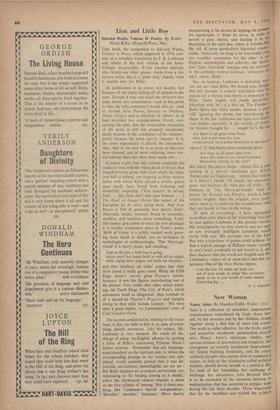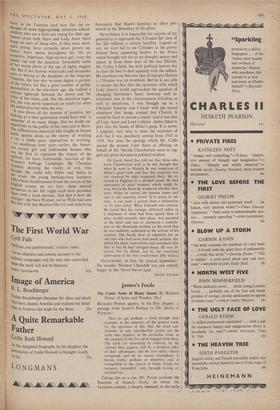New Woman
Nancy Astor. By Maurice Collis. (Faber, Ns.) THIS is a collection of anecdotes, impressions, reminiscences contributed by Lady Astor her- self, by her servants and by her children, strung together along a thin line of dates and events. The result is rather effective; for the lively, naive and somewhat incoherent presentation exactly suits Nancy Astor's enormous vitality, her curious mixture of shrewdness and simplicity, her courageous yet entirely incoherent benevolence, her faintly bullying femininity, and the extra- ordinary paradox that anyone with so impulsive a nature, so little of the calculation called political wisdom, should devote herself to a political life. To read of her friendship, her exchange of badinage, her adventures, with Bernard Shavi is to be reminded of the immense increase in sophistication that has occurred in popular taste during the last three decades. Those wisecracks that hit the headlines and tickled the public's fancy in the Twenties read now like the ex- changes of some high-spirited, attractive school- children who are a little too young for their age. Indeed about both Shaw and Lady Astor there hangs an aura of those who, if they were never quite young, have certainly never grown up. Nancy Astor seems throughout her life an impulsive, imperious, high-spirited girl; even the Jaunty cap and the quizzical, formidable smile of her recent photo at the age of eighty suggest this. But if her famous wisecracks and escapades Seem to belong to the headlines of the long-ago Twenties, she was also in some degree a portent of the future, for like a great number of public Personalities in the television age, she walked a curious tightrope between the clown and the critic of her times, and, like the television sages, too, she was never important so much for what she achieved as for what she was. It was above all the element of paradox, her flaking, as a later generation would have said. 'a nonsense' of so many things, that no doubt en- deared her to the public of her time and to Shaw. The millionairess democrat who fought an honest battle against drink as the enemy of working wves---a battle more appropriate to working- ASS conditions forty years earlier; the Ameri- can society girl and fashionable hostess who Was the first to represent the victory of the stalwart, far from fashionable, warriors of the omen's Suffrage Campaign; the Christian Scientist, .denying the reality of evil, who !bought she could take Hitler and Stalin in belle stride; the young hunting-crazy Southern 1.1elle whose fastidiousness found the morals of the cnglish county set too fast : these natural Paradoxes in her life might each have provided Shaw with a fresh heroine. And that is how she emerges. the New Woman, not as Wells had seen her, but with that Beatrice-like wit and underlying
femininity that Shaw's heroines so often pre- sented to the Benedicts of his plays.
Nevertheless it is impossible for anyone of my generation to approach the 'Cliveden Set' time of her life without a certain hostility. Legend or not, we were led to see Cliveden as the power behind those appeasing leaders in the Times which brought war (or so we thought) nearer and nearer in those tense days of the late Thirties. Mr. Collis, I think, has little political interest but he does his best to deal squarely with the subject. He convinces me that any idea of real pro-Nazism a; Cliveden was an invention. But he is not able to escape the fact that the optimism with which Lady Astor's world approached the question of changing Germany's heart, however well in- tentioned, was in the circumstances frivolous as well -as disastrous. I was brought up as a Christian Scientist and I know well the unreal sweetness that hangs around that Church. It would be hard to choose a creed—and it was that of Lady Astor and Lord Lothian—better fitted to play into the hands of Hitler's gang. It is never, suppose, very wise to deny the existence of evil, but it was peculiarly unwise from 1933 to 1939. Nor does the apology which Mr. Collis quotes the present Lord Astor as offering on behalf of Mr. Neville Chamberlain seem to sug- gest any great increase in political wisdom.
He [Lord Astor] has told me that those who knew Chamberlain well, as he did, thought that when he went to Munich he was suspicious of Hitler's good faith and that this suspicion was not removed by what happened there. He re- turned to England in a divided mood. He had assurances of great moment which might be true, but in his heart he wondered whether they were. When he waved the famous paper and said to the yearning crowd is peace in our time,' it was more a gesture than a declaration of his firm belief. What followed was curious. He found that his message, delivered rather as a statement of what had been agreed than of what would certainly take place, was accepted as the latter and was so enormous a consola- tion to the thousands waiting on his word that he was suddenly acclaimed as the saviour of his country. This heady dose of adulation for an old man who had never had much acclaim, dis- pelled his inner reservations and convinced him that in fact he had salvaged peace. He was de- ceived, itot by Hitler, but by the emotional admiration of his own countrymen. [My italics.]
Government, in fact, by mutual hypnotism! No wonder Winston Churchill was not entirely happy in this Never-Never land.
ANGUS WILSON







































 Previous page
Previous page